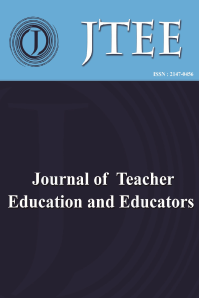The Complementary School-University Partnership through the Lens of a Learning Community
The Complementary School-University Partnership through the Lens of a Learning Community
The paper includes the results of a descriptive case-study in which a university-based Hungar- ian practice school is compared to the model of Professional Development School. Data sourc- es include school teachers (N=102), university educators of subject methodology (N=20) and pre-service teachers doing their group practice at the university’s practice school (N=22). The data were collected via a set of questionnaires and analyzed with descriptive and mathemati- cal statistics. The open-ended questions were content analyzed with an open coding process of the answers. The results proved that teachers and university educators in complementary university-school partnership are very far from the core concept of Professional Development School. Cooperation of teachers and university teachers does not take privilege in any par- ties’ beliefs. The main goal of the school practice is to improve candidates’ individual skills, but those of enhancing collaboration are not developed adequately. Furthermore, the lack of cooperation is a relevant issue among school teachers concerning their beliefs related to the teaching-learning process.
Keywords:
teacher education, university-school relationship school practice, professional development school,
___
- Carlson, H. L. (1999). From Practice to Theory: a social constructivist approach to teacher education. Teachers and Teaching: theory and practice. Vol. 5, No. 2, pp. 203-218.
- Clark, R. W. (1999). Effective professional development schools. San Francisco: Jossey-Bass. (ED 429 935)
- Darling-Hammond, L. (2006). Constructing 21st-Century Teacher Education. Journal of Teacher Education, Vol. 57, No. X, 1-15.
- European Commission (2015). The Teaching Profession in Europe: Practices, Perceptions, and Policies. Eurydice Report. Luxembourg: Publications Office of the European Union.
- Feiman-Nemser, S. (2001). From preparation to practice: Designing a continuum to strengthen and sustain teaching. Teachers College Record, 103(6), 1013-1055.
- Furlong, J., Campbell, A., Howson, J., Lewis, S. and McNamara, O. (2006). Partnership in English Initial Teacher Education: Changing Times, Changing Definitions. Evidence from the Teacher Training Agency's National Partnership Project. Scottish Educational Review, 37: 32–45.
- Garvin, D. A. (1993). Building a Learning Organization, Harvard Business Review, July-August, 1993 Issue.
- Hagger, H., & McIntyre, D. (2006). Learning Teaching from Teachers: Realizing the Potential of School-based Teacher Education. McGraw-Hill International.
- Holmes Group (1986). Tomorrow's teachers: A report of the Holmes Group. East Lansing, MI Holmes Group.
- Holmes Group (1990). Tomorrow's teachers: Principals for the design of professional development school. East Lansing, MI Holmes Group.
- Jensen, B., et al. (2012). The Experience of New Teachers: Results from TALIS 2008, OECD Publishing.
- Hungarian Government (2012). 283/2012. (X. 4.) Korm. rendelet a tanárképzés rendszeréről, a szakosodás rendjéről és a tanárszakok jegyzékéről (Edict of Hungarian Government of the system of initial teacher education and the specialization process; the list of majors).
- Krippendorff, K. (2004). Content Analysis: An Introduction to Its Methodology (2nd ed.). Thousand Oaks, CA: Sage.
- Korthagen, F. and Kessels, J. P. (1999). Linking Theory and Practice: Changing the Pedagogy of Teacher Education. Educational Researcher, 28(4), 4–17.
- Levine, M. (1997). Introduction. In.: M. Levine & R. Trachtman (Eds.), Making professional development schools work: Politics, practice, and policy (pp. 1-11). New York: Teachers College Press. (ED 411 222)
- Murray, J., Swennen, J., Kosnik, C. (2019). International Research, Policy and Practice in Teacher Education. Springer International Publishing.
- OECD (2014). TALIS 2013 Results. An International Perspective on Teaching and Learning. Paris: OECD.
- Putnam, R., & Borko, H. (2000). What do new views of knowledge and thinking have to say about research on teacher learning? Educational Researcher, 29(1), 4-15.
- Senge, P. M. (1990). The Fifth Discipline. New York: Dubbleday.
- Shulman, L. S. (1986). “Those who understand: Knowledge growth in teaching.” Educational Researcher Feb. 1986: 4-14.
- Stéger, Cs. (2014). State of play in teacher education in Hungary AFTER the Bologna reforms. Eötvös University Press.
- Stake, R. (1998). “Case Studies” In: Norman Denzin & Yvonna Lincoln. (eds.): Strategies of Qualitative Inquiry. Thousand Oaks, London, New Delhi: Sage.
- Vick, M. (2006). “It's a difficult matter”: Historical perspectives on the enduring problem of the practicum in teacher preparation. Asia-Pacific Journal of Teacher Education, 34, 181-198.
- Yin, R. (1993). Applications of case study research. Beverly Hills, CA: Sage Publishing.
- ISSN: 2147-0456
- Başlangıç: 2012
- Yayıncı: İlknur GÖKÇE
Sayıdaki Diğer Makaleler
Bünyamin YURDAKUL, T. Oğuz BAŞOKÇU, Ümran YAZICILAR
Anastasia PAPAPOSTOLOU, Polyxeni MANOLİ, Anna MOUTI
Hannah MEİNEKE, Danielle DEVASTO
Communication Skills and Classroom Management: The Mediating Role of Problem Solving Skills
The Complementary School-University Partnership through the Lens of a Learning Community
Judit ORGOVÁNYİ-GAJDOS, İda ZAGYVÁNÉ-SZŰCS
Narrative Inquiry: Examining the Self-Efficacy of Content Area Teacher Candidates
